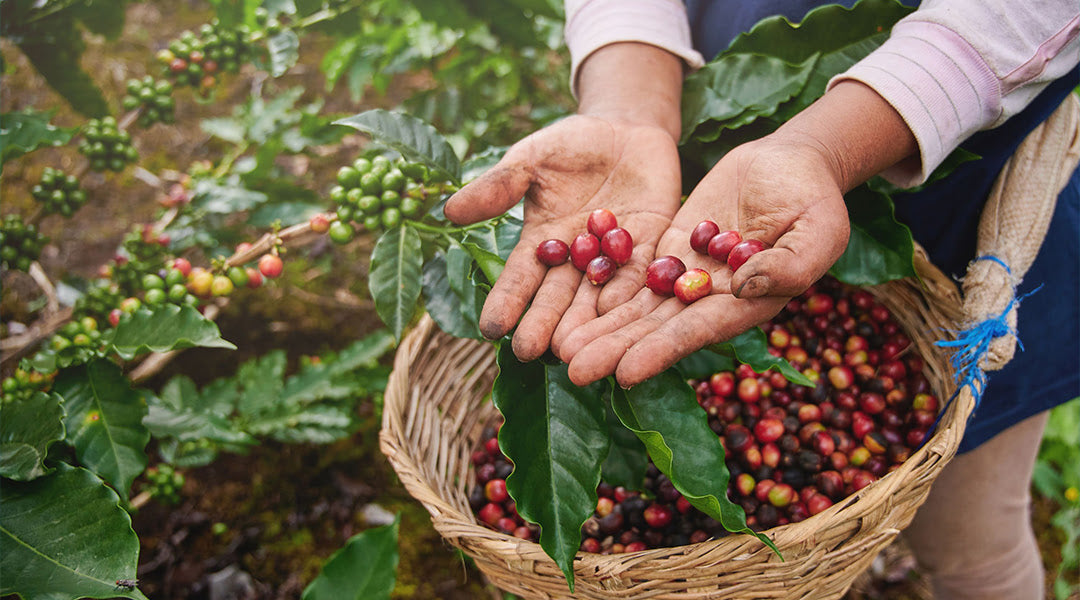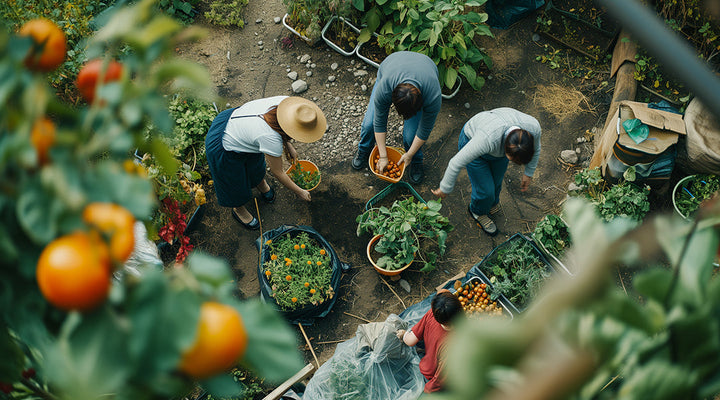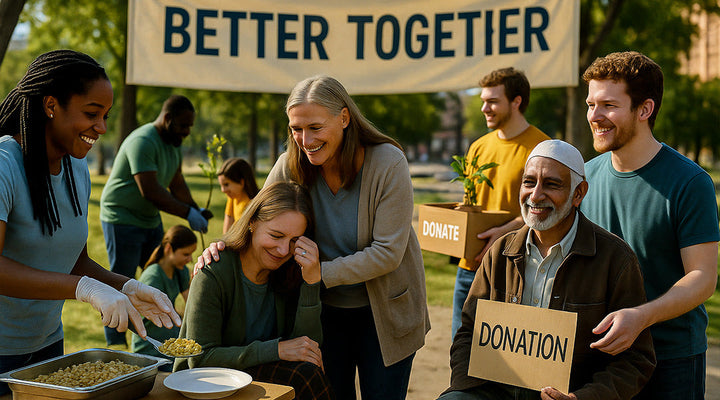
Battling Poverty, Pollution, And Poor Product Quality With Fair Trade Coffee Farming
Coffee can be a tricky subject.
Why?
Because depending on where your coffee is grown, or rather who grows your coffee, the contents of your mug can vary greatly.
Some coffee is grown on large plantations where entire forests are cleared so thousands upon thousands of coffee shrubs can be planted in rows out in the sun to accelerate growth.
And, on these same types of farms, workers spray pesticides, fertilizers, herbicides, and other harsh chemicals to ward off pests, speed up growth, and treat common plant diseases.
To make matters worse, profits on such plantations pass through so many hands that farmers and workers are at the bottom of the totem pole, rarely making a living wage, continuing a cycle of poverty for generations to come.
Then, there’s another method of growing coffee; in this method, coffee is grown by millions of farmers all across the world on very small, private, farms, often located in remote villages. On these farms, families learn to grow coffee as a way of life, their knowledge and skill passed down from one generation to the next.

This method of growing coffee works with the native plant and animal life in a given region, allowing nature to protect the coffee shrubs with shade from lush green plants above, then fertilizing these same plants with waste from nearby animals, decomposing leaves from surrounding fauna, and on and on.
Here, the coffee cherries are healthier, having never been polluted by harsh chemicals.
Here the surrounding land and other wildlife are protected.
And here, using these growing practices, farmers can produce a quality coffee crop on their own family farm and work in partnership with companies who pay them a good, fair wage, which in turn allows farmers to provide for their families and invest in their communities.
These are clearly two very different pictures, and in the end, two very different cups of coffee.
One type of coffee described above is conventionally produced.
The other is known as fair trade coffee.
Today we’ll be looking at fair trade farming, exploring the partnership between coffee farmers, companies, and consumers, looking at what this practice is and all the ways fair trade farming benefits the environment, coffee, and you!
What is Fair Trade Coffee And Why Is It So Important?

We’ll start by stating the obvious here - the United States isn’t exactly a prime location to grow coffee.
Coffee grows best at high elevations, or in mountainous areas, and in tropical climates. So, US coffee companies must make international partnerships to be able to bring truly great coffee to the states.
Fair trade describes a specific type of partnership between US companies and international farmers that puts sustainable farming practices, transparency and respect, or fairness, front and center.
Fair trade farmers have more control over their lives, livelihoods, and futures as they connect directly with those people or companies who buy their products.
Simply stated, I suppose you could view fair trade coffee farming as a win-win-win situation.
So, let’s use that win-win-win label to explain fair trade farming in a little more depth.
First, with fair trade farming, the farmers win.
In the case of conventionally traded (and grown) coffee, unfortunately, the poorest farmers and workers are routinely discriminated against, often lacking fair wages.
Fair trade farming combats such injustices by requiring those companies in these partnerships to pay a sustainable price or wage to farmers who incorporate the practices/growing methods outlined in fair trade standards.
And, in most cases, fair trade farmers also receive a premium or an extra sum of money they are able to invest in their farm, family, community, and future.

But, with fair trade farming, the companies in this type of partnership win as well.
Fair trade practices allow those companies in partnership with coffee farmers to work directly with these knowledgeable growers to better understand any needs they may have, ensuring the best outcome for both parties in the partnership.
Fair trade standards also address risks within the supply chain, which is great for both farmers and the companies they partner with.
Then, while this is a little more broad, fair trade addresses the needs of both the farmer and the company purchasing their product as the practices that must be incorporated in such a relationship ensure the farmer and the land where their coffee is grown is always protected.
Using sustainable farming methods ensures the small plantations where such coffee is grown will be preserved and profitable for generations to come, which translates to a win for both the farmers and the companies they supply.
And lastly, in fair trade coffee farming, the consumer wins as well.
Lifeboost coffee is organic, single origin, specialty coffee that is grown sustainably at high elevations without the use of pesticides, fertilizers, or any other harsh chemicals.
While not all fair trade practices produce coffee in this exact manner, many of the items in that list are musts in fair trade farming.
This means, with fair trade, customers are receiving an exceptional product that has been produced with quality as a primary priority.

Fair trade standards dictate that farmers must:
- Improve soil and water quality
- Manage pests without the use of harsh chemicals
- Manage waste
- Reduce greenhouse gas emissions
- Protect biodiversity
While fair trade farming does not require organic certification due to cost and location for some farmers, many of the practices put in place in these growing methods mirror organic growing practices.
The result is a protected planet, a superior product, and a sustainable, fair living wage for farmers.
To sum it up - fair trade coffee, or fair trade farming practices are vitally important!
Fair trade coffee farming…
- Ensures our planet isn’t ravaged by deforestation or polluted through the use of harsh chemicals in the growing process
- Supports the families and futures of coffee farmers and those in their community (even if market coffee prices drop)
- Ensures that the coffee produced is dependable, nonGMO, and of a greater quality than conventionally grown coffee
- Protects the health of coffee farmers by never allowing the use of disease-causing pesticides and fertilizers
- Combats poverty, common amongst coffee farmers, by promoting trade, which is a proven economically sustainable model
Without fair trade coffee farming practices, these farmers (and their families) would likely fall victim to the same cycle of poverty seen amongst many commercial coffee growers.
And, without fair trade coffee farming, some of the world’s best tasting, most pure coffee would not be accessible to consumers.
Lifeboost Fair Trade Practices
Lifeboost fair trade practices could simply be summed up by taking a look at our 4 pillars, the primary things that drive us as a company. While we didn’t arrive at these 4 core principles with fair trade practices solely in mind, it’s hard not to see the heart of fair trade coffee in each pillar.
1- Clean

Throughout this article today we detailed the importance of the very specific, sustainable, organic, environmentally friendly farming practices that are at the heart of fair trade coffee. And, these practices are wholly in line with our mission as a company and as individuals who value health and happiness.
Regarding health, we recommend (and live by) what is often referred to as the 80/20 rule. Essentially, we strive to put only clean foods and beverages into our bodies, at least 80% of the time.
Regarding happiness, we’ve found that when we prioritize clean eating/living, happiness often follows.
Our founder and CEO, Dr. Charles Livingston, says it best here: Dr. Charles has often said regarding Lifeboost that he personally wouldn’t want to drink anything but the cleanest, healthiest, purest coffee available, so he certainly wouldn’t want to bring anything but the cleanest, healthiest, and purest coffee to our customers.
Fair trade farming practices not only protect the environment and promise a fair wage to farmers, these methods also ensure a clean, healthy, and pure product, making our clean pillar an appropriate cornerstone in our commitment to fair trade coffee farming.
2- Cause

Our second pillar describes, a bit more in depth, our commitment to fair trade coffee.
We strongly believe in supporting those causes we truly believe in. And here, this means we support our farmers, their families, and their communities.
Of course, if you’ve been a Lifeboost customer for very long, you likely know we also love to support people, communities, and organizations closer to home as well - such as our local police, fire, and emergency personnel, our local teachers and nurses, shelters, food pantries, and other service-related organizations, and much, much more.
But, when it comes to our farmers, we seek to get even more involved.
Lifeboost sources the top 2% of coffee in the world. We’ve accomplished this by getting to know farmers from small communities in Central America and a few other select locations across the globe.
These farmers grow coffee on very small plantations, monitoring every aspect of the growing process through knowledge passed down through years of experience. These farmers and their families have become like family to us. And, by working directly with our farmers, we are able to support them appropriately through fair wages so they are ensured a better life.
In Central America, where the majority of our coffee is grown, we invest in their children, families, and community specifically have partnered with organizations such as Project Alianza, an alliance of advocates building schools and providing educational programs which promote literacy and other skills children need to thrive beyond life on a coffee farm.

Schools in these areas are often miles away across dangerous mountain terrain, they are commonly unhygienic, and many children are denied access to education for some of these detrimental reasons.
Through our partnership with Project Alianza, the schools that have been built in the small communities where our farmers live now offer not only education, but hope for a bright future.
We have also partnered with a few farmers who grow coffee on small farms in Africa, and here we’ve been able to provide new coffee shrubs for farmers, easing their financial burden.
In Uganda we’ve also been able to provide clean water for the communities where our farmers live, lunches for school children, support for victims of human trafficking, and aid for local women seeking to build businesses.
At the heart of fair trade coffee is a care for others, specifically for those growing our coffee, and as we believe in supporting causes near and dear to your heart, our farmers, their families, and their communities will always be worthy of our care, partnership, and support.
3- Connection

Connection, as it pertains to coffee, can commonly be seen as we share cups with friends and family, perhaps enjoying a mug or two as you catch up with a cousin or meeting coworkers for coffee as you work towards a common goal.
However, when it comes to our coffee farmers, this means a bit more.
Without connection, we wouldn’t have Lifeboost coffee.
We have a good working relationship, a connection, with each of our farmers. This is how we’re able to source the top 2% of coffee in the world, working closely with these growers.
We’ve, of course, been privileged to travel to some of these areas and speak with our farmers personally. And, some of our team members have even been able to travel to Central America recently to see the completion of another school built in the community where our farmers live.
Distance may not allow us to regularly connect in person with our farmers, but striving to stay connected, despite distance, is what allows us to better know the needs of our farmers and their communities.
One common complaint regarding fair trade coffee is that due to the organic and sustainable growing practices used in this method, the products are often sold at a higher price, which can lead to a lack of sales and less money for coffee farmers.
However, our commitment to connection ensures this does not happen.
By staying connected to our farmers, this means we’re connected to precise growing practices, those which produce some of the best tasting, cleanest, low acid coffee we’ve ever sipped and savored.
These practices and the resulting product, along with our commitment to bringing clean, healthy coffee to our customers, have allowed our company to grow at such an amazing rate…and this means our farmers’ lives, their families’ lives, and their communities are continually enriched.
We believe this element of connection is a vital part of our success as a company.
Connection must be at the heart of fair trade coffee farming, and we’re grateful to be, and stay, connected to our farming family.
4- Kindness

If you take a glance at our website, under the kindness pillar section you’ll see the following description: “We believe that in order to make the world a better place, it all comes down to treating people how you would like to be treated…with love, honor, and respect.”
And frankly, this pillar, this Lifeboost definition of kindness, is at the heart of fair trade coffee farming.
Within the coffee growing industry, according to our description of kindness, these sentiments are often lacking.
Large coffee corporations that grow massive amounts of coffee to meet market demands often clear entire areas of forest, only to rapidly grow row after row of coffee in the sun, using harmful pesticides, fertilizers, and other chemicals, all of which play a part in degrading and polluting soil, waterways, wildlife habitats and populations, and this produces a cheap, oftentimes toxic, product.
Insert a middle man or two into the process, and the farmers who grow these crops are not only paid horribly unfair wages, they also commonly suffer from the effects of these growing practices on their health.
Conventional (non fair trade) growing practices rob farmers of a fair living, their health, and potentially their future as the environment certainly cannot sustain such farming methods.
We fail to see any level of kindness in such practices.
By incorporating fair trade coffee growing methods, we’re treating our farmers, their communities, and our planet with the same kindness, love, honor, and respect we desire.
And, as we close today, we’d like to express our deepest gratitude to our farmers. We’re proud of and grateful for the relationships we have with those who grow Lifeboost coffee.
We stand behind the extra measures taken to ensure…
- our planet is protected
- our coffee is grown sustainably
- and our farmers are well-compensated
Each of these play a vital role in what makes Lifeboost coffee the best tasting, healthiest coffee on the planet!
Disclaimer: Beginning in 2025, Lifeboost Coffee primarily sources our coffee from farms in Honduras. Our practices of fair wages, sustainable growing methods-from shade to zero chemicals-all are still a part of our operations and are key to what makes our coffee health, delicious, and ethical. Only our farming locations have changed so that we can continue these ethical practices while also meeting our customer demands.

Becky is a mother, educator, and content writer for Lifeboost Coffee. She has had three years’ experience as a writer, and in that time she has enjoyed creatively composing articles and ebooks covering the topics of coffee, health and fitness, education, recipes, and relationships.
- https://fairtrade-advocacy.org/definition-of-fair-trade/
- https://www.fairtrade.net/product/coffee
- https://groundsforchange.com/blogs/learn/fair-trade-coffee
- https://www.rainforesttrust.org/
- https://merrittsbrookacademy.e-act.org.uk/wp-content/uploads/sites/15/2020/03/Year-5-Fair-Trade-Geography-Knowledge-Organiser-Term-4-1-1.pdf
- https://www.fairtrade.org.uk/for-business/why-partner-with-fairtrade/
- https://www.fairtrade.org.uk/media-centre/blog/what-is-the-difference-between-fairtrade-and-organic/
- https://www.fairtrade.net/issue/environment
- https://www.uwe.ac.uk/about/values-vision-strategy/sustainability/fairtrade-facts-and-benefits
- https://www.fairtrade.net/news/wake-up-six-reasons-to-choose-fairtrade-coffee
- References for the article to confirm data and information.










